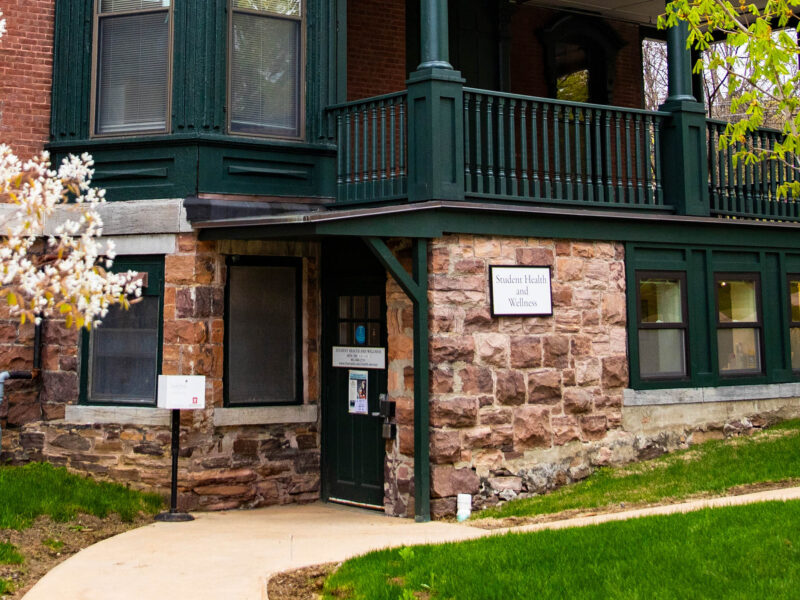
What is a respiratory virus and what can I expect?
The common cold, influenza, and COVID-19 are all caused by respiratory viruses. They usually start with symptoms such as a sore throat and runny nose followed by coughing and sneezing.
Because these illnesses are caused by viruses, antibiotics will not help you recover from them. The best way to help yourself recover is to get lots of rest, drink plenty of fluids, and avoid smoking and second-hand smoke exposure. See below to find more specific information about how to manage symptoms, when to stay home, and when to see your healthcare provider.
Stay-at-home Guidelines, Testing, Illness Exposure, and Return to Activity
-
What should I do if I develop symptoms of a respiratory virus?
- Wear a well-fitting mask and avoid contact with others.
- Stay home from normal activities, including class, if you have had either in the last 24 hours:
- A fever greater than 100.4° F
- Severe symptoms of a respiratory illness
- If you are concerned, discuss your symptoms with Student Health or your healthcare provider, especially if you have medical conditions that put you at risk for more serious illness.
- The decision to take a COVID test can be made on an individual basis. A positive or negative test will not change illness recommendations. Individuals who are at increased risk for complications from COVID-19 may wish to test if it will impact treatment decisions.
- Practice good hygiene measures, get lots of rest, stay well hydrated and care for your symptoms using our tips for symptom management below.
- You may pick up your meals to go at IDX by filling out the Sick Meal Request Form.
- If you have any questions or concerns about your health, please contact the Student Health Center at (802) 860-2711 or email healthservices@champlain.edu.
-
When can I return to normal activities?
You may return to normal activities when, for at least 24 hours, both are true:
- Your symptoms have greatly improved, and
- You have not had a fever (and are not using fever-reducing medication).
Continue these precautions for 5 days after returning to normal activities:
- Consider wearing a well-fitting mask and avoiding prolonged contact with others.
- Practice good hygiene: wash your hands often and use hand sanitizer, cover your mouth when you cough or sneeze, and disinfect personal spaces.
- Enjoy fresh air, take walks outside, and maintain good air circulation in your room.
- If you develop symptoms or a fever again: stay home until your symptoms are improving overall, and you are fever-free for 24 hours (without the use of fever-reducing medications).
-
What if I need to miss class?
- Contact your professors if missing classes, and together create a plan to make up for missed class work.
-
What should I do if I was around someone who is sick?
- Monitor yourself for symptoms.
- You may attend class if you are feeling well.
- Consider wearing a mask around others for extra protective measures, especially if you or the people around you are at higher risk of getting very sick, or if you are unable to remain separate from the person who is ill.
- If you develop symptoms, refer to “What should I do if I develop symptoms of a respiratory virus?”.
Treating Symptoms at Home
-
General Care
- Wash your hands frequently with soap and water.
- Get plenty of rest/sleep. Resting is vital to your body’s healing process.
- Stay hydrated. Choosing water or sports drinks can help you stay hydrated while alcohol, coffee, or any caffeinated drinks may contribute to dehydration.
-
Sore Throat
- Sipping on warm liquids such as soup or brewed tea with honey; ice chips, lozenges, or a saltwater gargle (1/4 to 1/2 teaspoon of salt dissolved in an 8-ounce glass of warm water) may help soothe a sore throat.
- Using a humidifier or cool mist vaporizer to add moisture to the air can be soothing.
- Taking OTC pain relievers, such as acetaminophen (Tylenol), ibuprofen (Advil or Motrin), or naproxen (Aleve) can help reduce the pain associated with a sore throat.
-
Cough
- Sucking on a cough drop will help keep your throat moist and relieve irritation.
- Consider cough medicine. It may be wise to consult a health care provider or pharmacist if you’re not sure which one to choose. A product containing dextromethorphan (Robitussin) will help suppress a cough. Guaifenesin (Mucinex) is an ingredient that helps to thin mucus, making it easier to cough up and relieve congestion.
-
Nasal Congestion
- Place a warm compress over the nose and forehead to relieve sinus pressure.
- Use saline nasal spray to help unclog a “stuffy” nose.
- Breathing in steam for 10 to 20 minutes several times a day may also relieve congestion.
-
Headache, Body Aches, or Fever
- Taking an OTC fever reducer or pain reliever medicine, such as acetaminophen, ibuprofen, or naproxen can help to reduce the pain associated with headaches, body aches, and prevent a fever.
When should I seek medical care?
-
Call the Student Health Center if you have:
- A temperature higher than 100.4°F (38°C)
- Symptoms that last more than 10 days
- Symptoms that worsen after starting to improve
- Symptoms that are severe such as chest pain or shortness of breath
- Any questions or concerns about your symptoms
Refer to our after hours instructions if you need medical attention when the Health Center is closed
Sick Meal Request Form
Please request your meals to-go if you are feeling sick.
You may send a friend to pick up your meals, or pick it up yourself. You will need to complete a new sick meal request form each day you are sick. Please pick up your meals at the times indicated on the order form by checking in at the front kiosk in the IDX Dining Hall, and then waiting out in the atrium with your mask on. You are also welcome to order food to-go from EATS.
Class Absences

Illness and injury may occasionally impact a student’s ability to attend class or to complete assignments. Students in this situation are urged to notify their instructors immediately when an illness or injury prevents them from attending a class or completing work. The Health Center does not provide written medical excuses for class absences. Students may request documentation to verify the date and time they were seen at the Health Center, but no further information will be provided. Students are responsible for making up all missed work.
This approach allows for students, as young adults, to advocate for themselves and take responsibility for their health and academics. This also encourages instructors to communicate directly with students if concerns arise.
Student Health Center
Location
203 S. Willard Street
Burlington, VT 05401
Office Hours
Academic year:
Monday–Friday, 8:30 AM–4:30 PM
*Closed daily from 12:00–1:00 PM
Fax Number: (802) 860-2761
Contact Us
Additional Resources

The Counseling Center offers a variety of services and resources in Skiff Hall. Schedule an appointment or contact our 24/7 on-call counselor.

Your personal and academic success tie directly to your wellbeing. Learn more about Dare to CARE, Champlain’s culture of wellbeing.

The Student Health Center is available to all degree-seeking on-campus undergraduate students. Get in contact with a health provider today!